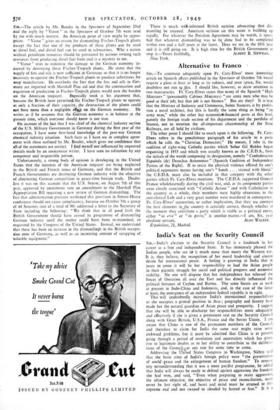Alternative to Franco •
Stx,—To comment adequately upon Fr. Cary-Elwes' most interesting article on Spanish affairs published in the Spectator of October 7th would require a gloss at least as long as its subject, and your space, Sir, would doubtless not run tp sits. I should like, however, to draw attention to two inaccuracies. Fr.lCary-Elwes states that many of the Spanish "High Ministers" (presumably Cabinet Ministers) " are army men who may he good at their job, but that job is not finance." But arc they? It is true that the Minister of Industry and Commerce, Senor Suances, is by profes- sion a naval architect, but this is hardly the same thing as being " an army man," while the other key economical-financial posts at this level, lamely the foreign trade section of his department and the portfolio of finance, not to mention the all-important chairmanship of the State Railways, are all held by civilians.
The other point I should like to touch upon is the following. Fr. Cary- Elwes refers in the penultimate paragraph of his article to a party which he calls the "Christian Democrats." He means, I take it, the coalition of right-wing Catholic parties which Senor Gil Robles began organising in 1933 and which was usually known as the C.E.D.A., from the initials of the words composing its designation, namely "Confederacion Espanola (de) Derechas Autonomas " (Spanish Coalition of Independent Parties of the Right). If to resist the physical violence offered by one's political opponents means having one's " hands . . stained with blood," the C.E.D.A. must also be included in that category with the other parties which Fr. Cary-Elwes mentions. The C.E.D.A. supported General Franco wholeheartedly during the civil war, and, as its component parties were closely associated with " Catholic Action " and with Catholicism in the country as a whole, their members were highly obnoxious to the anti-clerical Left and a very great number were murdered in consequence. Fr. Cary-Elwes' contention, or rather implication, that they are amongst the best elements in .ihe country is certainly correct, though whether at - the moment they constitute a party which is viable as a political entity, either " in esse " or " in posse," is another matter.—I am, Sir, your






































 Previous page
Previous page